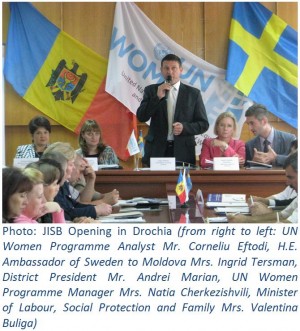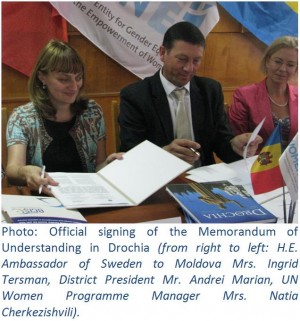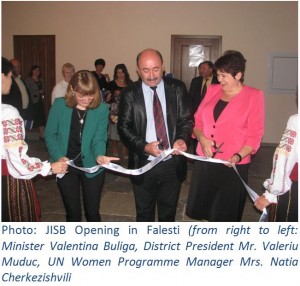Three more districts opened the door for women and men at local level to access information and services, now reinforced with the approved Government Regulation on the functioning of Joint Information and Services Bureaus in the Republic of Moldova
Date:
In September, series of important events marked the institutionalization and sustainability of Joint Information and Services Bureaus (JISBs) in the Republic of Moldova, an innovative “one-window” approach towards gender-sensitive and coordinated service provision.
Joint efforts of the Ministry of Labour, Social Protection and Family and UN Women led to the adoption of special Framework Regulation on the functioning of JISBs through Government Decision Nr. 661, published in the Official Monitor of the Republic of Moldova on 06.09.2013 (inMoldovan andRussian languages). The approval of the Regulation ensures the sustainability of the model and its successful institutionalization nationwide. In 2013, 16 districts with functioning JISBs received financial allocations from the state budget and as of 1 January 2014 all districts will have a dedicated budget for JISBs activity, including transportation and gasoline for mobile teams and internet access to use the information system developed for JISBs by UN Women in partnership with E-Government Centre.
JISB “one window” model was piloted in 2010 in four districts (Singerei, Telenesti, Nisporeni and Cantemir) and up to date is functional in 19 districts. JISBs provided information and services to more than 10,000 women and men, out of whom 65% are women and 85% from rural area. This innovative “one-window” approach to service provision enabled local public administration to reach vulnerable population, including rural women, to address their needs and economically empower them.
In September, JISBs were officially opened in three more districts: Drochia (on September 3, 2013), Falesti (on Septemebr 5, 2013) and Stefan Voda (on September 11, 2013), which is a clear indication of wide and successful replication process which started in 2012. The official launching events were attended by high-level Government officials, representatives of district administrations, donor and international organizations including Minister of Labour Social Protection and Family Mrs. Valentina Buliga and the Deputy Minister Ms. Ruxanda Glavan, H.E. Ambassador of Sweden to Moldova Mrs. Ingrid Tersman and the Swedish Deputy Head of Mission to Moldova Ms. Paola Albornoz, district presidents, Mr. Andrei Marian (Drochia district), Mr. Vasile Buzu (Stefan Voda district) and Mr. Valeriu Muduc (Falesti district), and UN Women’s International Programme Manager, Mrs. Natia Cherkezishvili. “The establishment of JISBs represents a unique and efficient model for local public administration, because it does not entail the creation of a new structure or recruitment of additional personnel”, said Deputy Minister of Labour, Social Protection and Family Ms. Ruxanda Glavan.
It is important to mention that even though the official openings took place in September, all three districts started their work at the beginning of the year through Mobile Teams to ensure that services are provided on a regular basis for populations living in remote and marginally accessible areas, including those vulnerable, disabled, and women with small children. “The JISB will bring municipal services closer to citizens, and will empower citizens and make local authorities more accountable. That is local democracy”, said Ambassador Tersman.
“The closer to the citizens decisions are made, the higher the likelihood that services meet the demand and needs of the customer: the citizen. We believe that here in Moldova, the one stop shops have done exactly this, and that may be why the demand has been so high. That is a good recognition of work done”, said Ms. Albornoz.
UN Women Programme “Women’s Economic Empowerment through Increasing Employability in the Republic of Moldova” is implemented jointly with Ministry of Labour, Social Protection and Family and Ministry of Economy of the Republic of Moldova with the financial support of the Government of Sweden. Improving access to quality information and services, strengthening the capacities of key national partners for implementation of policies which promote and protect women’s rights to employment and social protection and improvement of the legislative framework represent three main components of the programme.
For more information, please contact Janna Sofroni, Programme Associate at [ Click to reveal ]


